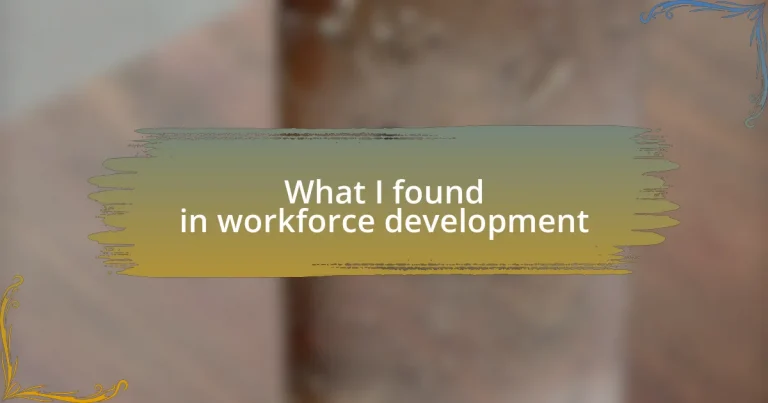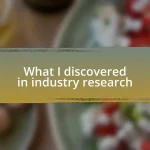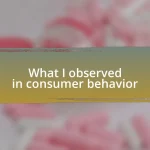Key takeaways:
- Workforce development enhances employee skills to meet evolving job market needs, fostering continuous learning and community growth.
- Investing in workforce development increases employee motivation, productivity, and strengthens organizational culture through collaborative environments.
- Addressing alcohol-related issues requires overcoming stigma and regulatory hurdles, and understanding individual stories for effective interventions.
- Personal experiences in workshops reveal the importance of vulnerability and community in reshaping relationships with alcohol.
Author: Clara Whitmore
Bio: Clara Whitmore is an acclaimed author and storyteller known for her captivating narratives and richly drawn characters. Her work spans several genres, including contemporary fiction and historical romance, often weaving elements of personal experience into her writing. Clara holds a Master’s degree in Creative Writing from the University of Edinburgh and has published three novels, which have garnered critical acclaim and a loyal readership. When she’s not writing, Clara enjoys exploring quaint bookstores and hosting literary workshops. She currently resides in Portland, Oregon, with her dog, Jasper.
Understanding workforce development
Workforce development is essentially about enhancing the skills and competencies of employees to better meet the needs of an evolving job market. I remember the first time I attended a workforce development workshop; it was eye-opening. The diversity in attendees gave me a sense of how universal this need is—whether you’re in a small startup or a large corporation, the drive to adapt and grow is a common thread.
Have you ever felt like your skills were outdated, or that you could contribute more if only you had the right training? That’s a sentiment I’ve encountered many times, both personally and in conversations with colleagues from various industries. Workforce development programs aim to bridge that gap, helping individuals to not just retain their jobs, but to flourish in them by fostering continuous learning and adaptation.
What’s particularly compelling about workforce development is its potential for community impact. When companies invest in their employees, it creates a ripple effect that often extends beyond the workplace. I’ve seen firsthand how upskilling initiatives can uplift entire communities, igniting local economies and fostering a culture of growth and innovation. Isn’t it thrilling to think about how investing in people can transform lives?
Importance of workforce development
Investing in workforce development is essential for any organization striving for success. I recall a time when my company implemented a mentorship program; the results were astounding. Employees not only gained new skills but also cultivated stronger relationships, creating a more collaborative environment that fueled innovation.
Have you ever watched a team flourish after receiving proper training? It’s like watching a garden bloom—each individual’s potential becomes apparent. When workers feel valued through development opportunities, motivation skyrockets, leading to increased productivity and lower turnover rates. That’s something I’ve observed time and again in workplaces committed to nurturing their talents.
Moreover, workforce development isn’t just about the individual; it’s about fostering a culture of growth that benefits everyone involved. I once attended a local business summit where several companies shared their employee success stories. The energy in the room was palpable, demonstrating how collective investment in skills not only elevates organizations but also strengthens entire industries. Isn’t that a powerful reminder of the impact of nurturing talent?
Key challenges in alcohol-related issues
Addressing alcohol-related issues poses significant challenges, primarily due to the stigma surrounding addiction. I remember a colleague who struggled with alcohol dependency; the fear of judgment prevented him from seeking help. It’s disheartening to witness how this stigma can be a roadblock, silencing those who genuinely need support.
Regulatory hurdles also create obstacles in effectively tackling alcohol-related problems. In my experience working with various community outreach programs, I’ve learned that compliance with stringent laws can slow down initiatives aimed at education and prevention. How can we expect to make meaningful progress if the very structures meant to help are slow to adapt?
Finally, there’s the complexity of understanding individual factors that contribute to alcohol misuse. Each person’s story is unique—like a puzzle where many pieces don’t seem to fit together. I recall listening to a heartfelt account of how trauma fueled someone’s drinking; it was a poignant reminder that to develop effective interventions, we must dive deeper into personal histories. Isn’t it crucial that we consider these nuances to truly comprehend the breadth of alcohol-related issues?
Personal experiences with alcohol development
Personal experiences with alcohol development can often reveal profound truths about our relationship with alcohol. I once attended a workshop aimed at helping individuals reshape their drinking habits, and I found it both enlightening and humbling. Listening to others share their journeys made me realize the power of vulnerability; it was a space where storytelling was not only welcome but essential for healing.
I’ll never forget a moment during that workshop when a participant bravely recounted a time when alcohol nearly cost them their career. As he spoke, I couldn’t help but reflect on how easily one can overlook the toll alcohol can take on even those who appear successful. It was an emotional reminder that behind every drink is a story waiting to be discovered. How many of us inadvertently dismiss the struggles of others while we celebrate their successes?
Engaging with others in these settings deepened my understanding of alcohol’s impact. It struck me that development isn’t just about cutting down intake but about fostering connections. I remember leaving that workshop feeling a sense of solidarity with everyone there, fueled by the realization that our collective experiences could serve as a catalyst for change. Isn’t it fascinating how sharing our stories can create a supportive community that redefines our experiences with alcohol?


